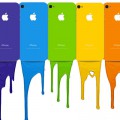Apple’s stock has plummeted, and the company no longer holds the title of world’s most valuable company. The drastic drop in Apple shares reflects the demanding expectations of investors, and fuels concerns that the company may be losing its competitive edge.
Highs and Lows
In the last full week of January 2012, Apple’s stock closed at $439.88, after falling 2.4 percent that day. And just 24 hours earlier, the company experienced the largest one-day drop in the history of the company, plunging 12 percent.
But just a few months earlier, Apple was breaking records at the other end of the spectrum. In September 2012, when the company released the iPhone 5, the price of the company’s stock reached an all-time high at $705.07.
Competition
However, the fifth version of the iPhone did not perform as well as expected, due in part to competition from the Samsung Galaxy S smartphone. Samsung’s well-orchestrated media blitz, which lampooned the iPhone, declaring “the next best thing is already here,” convinced many consumers to purchase the Galaxy S instead.
As a result, Samsung reported a 76 percent increase in profits last quarter, and the company controls 28 percent of the global smartphone market, up from 20% the previous year. On the other hand, Apple’s share of this market has only increased from 19% to 20% over the past year.
But even though Samsung leads the global market for smartphones, Apple generates more profits and revenue. And in spite of plunging stocks, Apple’s market value of $413 billion is almost twice the $217 billion market value of Samsung.
Higher Standards
So, why are Apple’s investors so squeamish, given the market value of Apple shares? Well, the company isn’t expected to just compete. The expectation is that Apple will set – and continually raise – the bar. However, the company has not released a new product since the iPad was rolled out in 2010.
In addition, Samsung has been able to match the quality and features of the iPhone at a cheaper price. The Korean company has the advantage of using its own manufacturing facilities to build smartphones, which enables cost reduction. However, Apple relies on other manufacturers – including Samsung – to build iPhones.
These factors create a perfect storm for investors who are unsure that Apple can continue to be a trendsetter and wonder how long consumers will continue to pledge allegiance to new versions of the same higher-priced products.
[cf]tracking[/cf]






No Comment